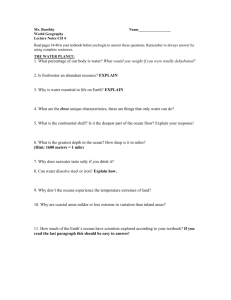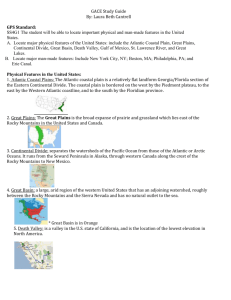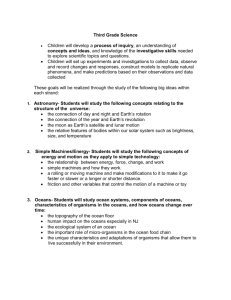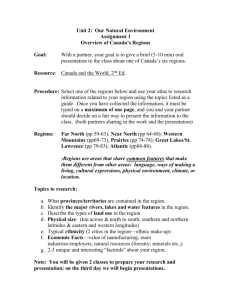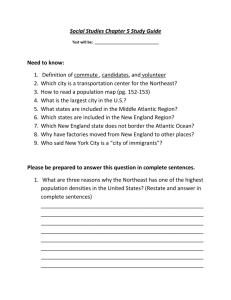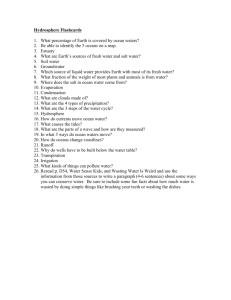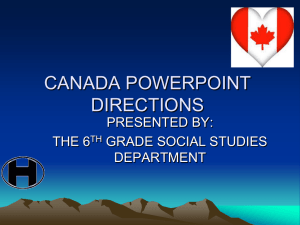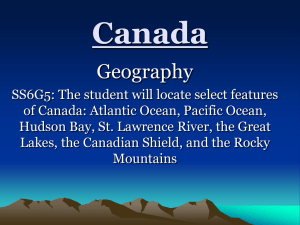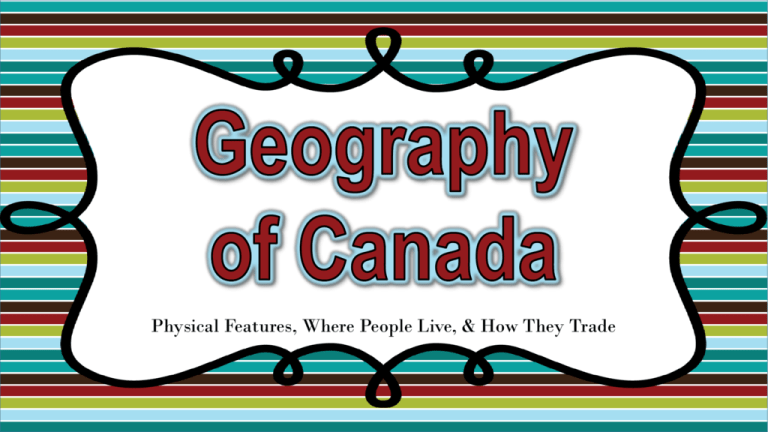
Physical Features, Where People Live, & How They Trade
• 5 large freshwater lakes in central North America
• HOMES (Huron, Ontario, Michigan, Erie, Superior)
• Serve as the “industrial heartland” of the continent
because of all of the factories
• One of the world’s busiest shipping areas
• Most of Canada’s population lives in this region
• Major source of overseas and US/Canada shipping
& trade
• Shortcut that connects the Great Lakes to the
Atlantic Ocean
• Huge producer of hydroelectricity
• A canal completed in 1959 at the eastern end of the Great
Lakes
• Connects the Great Lakes with the St. Lawrence River
(which flows to the Atlantic Ocean)
• Major source of overseas and US/Canada shipping & trade
• Closed from November to April (frozen)
• Seaway has made cities in Eastern Canada home to many
successful manufacturing companies
• HUGE inland sea in east central Canada
• “an arm” of the Atlantic Ocean
• Grain from Alberta & Saskatchewan is shipped
from Hudson Bay out to the Atlantic and on to
other countries
• Only navigable from July to October
• This is the 2nd largest of the earth’s 5 oceans.
• It’s also the most heavily traveled ocean.
• It forms the eastern border of Canada.
• It’s a major shipping route to Europe & Africa.
• Largest & deepest of the world’s 5 oceans
• Covers 1/3 of the earth’s surface!
• Western border of Canada
• Major shipping route to Asia
• Stretches from Great Lakes to Arctic Ocean; covers half of
Canada!
• Horseshoe region around Hudson Bay
• Region of mostly thin soil lying on top of rock, with many
bare outcrops of rock & thousands of lakes
• Major source of natural resources: timber, minerals, & water
• Region is sparsely populated.
• Mountains located in Western Canada
• Includes western Alberta and eastern British Columbia
• Stretch a distance of 2,000 miles!
• Mining is the biggest industry in the region, followed closely
by logging.
• Major minerals include: iron ore, copper, coal, gold.
• Sparsely populated & contain few cities
Your Task:
• Choose 1 of the physical features
• Fold your paper “hamburger style” to make a desk tent
• On the front : Imagine that you are one of the features. Write 5
facts about yourself.
• On the back: draw an illustration of the feature
We will walk around and try to guess the features!
Brrrrr! I am always so cold!! It’s chilly up here in
northern Canada. I am so tired of everybody
always picking on me. Dig, dig, dig all day long. I
wish I had some pretty trees to look at…All that I
can see is scraggly trees and flat, rocky land. It’s so
lonely. No one lives near me.
Teachers
Project the following slide on the board/wall,
and have students point out or label the
physical features.
• 2nd largest country in the world (Russia is larger)
• Surrounded by three oceans: Atlantic, Arctic, & Pacific
• Southern border is the US
• Alaska also forms part of the western border.
• Population is 33 million, which is small compared to its size
(US population is 9 times larger!)
• 90 percent of population lives within 100 miles of the USCanadian border…WHY?
• Canada’s location in the world helps it to be a leader in world trade:
• It’s uniquely located on 3 oceans, so it has opportunities to trade with
Europe & Asia.
• Great Lakes and the St. Lawrence Seaway allow goods to be shipped to
and from central Canada and the Atlantic Ocean
• A major benefit for Canada is its border with the US (#1 trading partner).
• Share over 3,000 miles of border & trade is relatively easy
• 80% of Canada’s exports come to US
• Southeastern part of Canada has a MUCH warmer climate than the rest
of the country.
• Warm to hot summers & cold winters
• Allows for a long growing season
• Pacific coast has a temperate climate.
• Pacific ocean cools the region in summer and warms it in winter.
• Over 100 inches of precipitation per year
• Northern Canada is COLD!
• Few people live here – temperatures can be below freezing even in
summer!
• Canada’s location in the world helps it to be a leader in world trade:
• It’s uniquely located on 3 oceans, so it has opportunities to trade with
Europe & Asia.
• Great Lakes and the St. Lawrence Seaway allow goods to be shipped to
and from central Canada and the Atlantic Ocean
• A major benefit for Canada is its border with the US (#1 trading partner).
• Share over 3,000 miles of border & trade is relatively easy
• 80% of Canada’s exports come to US
• Rich in natural resources:
• coal, oil, natural gas, iron ore, nickel, zinc, copper, gold,
lead, molybdenum, potash, diamonds, & silver
• Rivers and lakes have an abundance of fish, fresh water, &
hydroelectric power.
• Good soil allows farmers to grow crops for Canadians--with
enough left over to trade with other countries
• Timber is also a major natural resource.
• Sells oil and natural gas, fish, agricultural products, & timber
to other countries
• Hydroelectricity is used in Canada and also sold to the US.
• 5% of the land in Canada is arable (actually a large amount
because there is so much land).
• Rich soil produces valuable crops that are consumed in
Canada and traded to other countries.
• Inside of the suitcase, draw FIVE things that you are going to take with you on our
class trip to Canada.
• Think about the location, climate, physical features, and natural resources of
the country. Look in your notebook for clues about what you might need on
your trip.
• Next, include a brief description of why you chose to bring that particular item.
• Color your suitcase—be creative!
• Example: I’m bringing a snowboard so that I can go down the Rocky
Mountains!
Teachers
I give my students the following handout at the beginning of our Canada unit. I tell
them to keep it handy in their Interactive Notebook, and whenever we discuss any
words that begin with certain letters, they are to write them down. The first person to
complete the chart wins a prize. *The words have to be things that we’ve discussed in
class, not things that they already know, so they must always pay attention!
Teachers
Thank you for downloading this file. I hope you enjoy using it with your students, and
I can’t wait to read your feedback in my TPT store!
• For more social studies materials, please visit my store:
http://www.teacherspayteachers.com/Store/Brain-Wrinkles
• I teach 6th grade Language Arts and Social Studies in Georgia, so my products are
aligned with Common Core (LA) and Georgia Performance Standards (SS).
© Copyright 2013. Brain Wrinkles. All rights reserved. Permission is granted to copy pages specifically designed for student or
teacher use by the original purchaser or licensee. The reproduction of any other part of this product is strictly prohibited.
Copying any part of this product and placing it on the Internet in any form (even a personal/classroom website) is strictly
forbidden. Doing so makes it possible for an Internet search to make the document available on the Internet, free of charge, and is
a violation of the Digital Millennium Copyright Act (DMCA).

